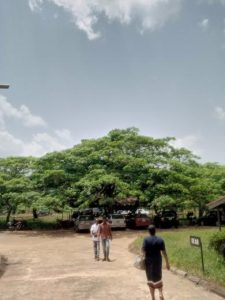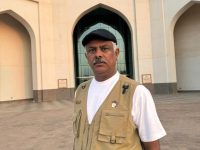It is the story of one war followed by another war. Yes, it is the…
Nigeria referred to as the giant of Africa…But really?
A nation rich in culture and diversity, yet plagued by numerous challenges that hinder its progress. A place with orderliness absent, and living conditions lower than zero. Where street life is the regular lifestyle and a second miscalculated could be a decision you live to regret.
In Nigeria, the youth comprising a significantly large portion of the population, face challenges that often push them towards crime and delinquency. Limited access to quality education, high unemployment rates, and inadequate opportunities for skill development contribute to a sense of disillusionment among the youth. Among these challenges are the plight of young people, the struggle of families to make ends meet, political instability, and rampant corruption.
Matthew Uyi is a young brilliant Nigerian artist, who testify the continuous difficulties he’s facing every day in a country full of energy but full of contradictions as well.
The lifestyle of Nigerians is majorly survival, luring young individuals into illicit activities and perpetuating a cycle of poverty and crime. The living conditions on the youth is tough and we have come to accept this lifestyle on a daily basis. For this era of youths marriage is not even an option until their life is a bit figured out. Most marry late because it is believed that the more heads you shoulder the more thinned out fulfilling your plans gets, especially if you don’t have a firm flow of income. So an average youth must have established a little before considering marriage so when he does he still is able to build additionally to what he already owns rather being a fresh wine. “A good marriage could represent a good business for females. The ultimate life goal of an average Nigerian lady is to school, graduate and then settle with an already established man, no plans for personal growth or the rest of that” according to Matthew.
For the average Nigerian family, managing the daily routine is a formidable task compounded by financial constraints. With a minimum wage that falls short of providing for basic needs, families struggle to put food on the table, access healthcare, and afford education for their children. A country where electricity bills amount to 70$ a month, transportation expenses up to $200, accommodation can get to $2000, feeding expenses $400 and the minimum wage for same month is $30. The pervasive poverty and challenges faced by families force them to make difficult choices between necessities.
You would think with the harsh living conditions birth rate would be minimal, but, in actuality, it’s reverse. The average family births 3/5 children while some birth up to 10 and they have their reasons. Some would argue that if any should die as a result of the low guarantee of standard living then they would still have enough successors. Others just birth children so they can use them for labour. Some homes survive on the roadside begging of their children or street hawking of basic amenities like water, fruits and others.
“My dad worked super hard as a child up until becoming a young adult and he trained himself in school because he wished to be educated even upon seeing that his parents cared less about education and couldn’t support him. He would farm alone in the bush before and after school finding things he could sell and raise school money. Eventually he did it! Mum… she lived as a maid and was treated poorly she tells the story everytime. She couldn’t school but she would hawk things to raise money for the house she lived in to train their own kids”
Let’s talk about the educational system, greatly lacking in facilities and competent teachers with actual knowledge to imbibe. “We basically pay tuition fees only to end up teaching ourselves, owing to the unchecked educational system – Matthew says- Teachers either don’t show up for class or when they do, don’t teach with updated schemes. The students have to teach themselves through research and sit for exams for classes never had. The schools that come a bit competent are put at exorbitant prices that the common man can’t even dream to afford. I thought we had the power to dream and control our own dreams?! As if that isn’t messed up enough we graduate and have no jobs provided. I could safely say 85 percent of graduates are unemployed and most of the employed ones are either employed in fields totally different from what they studied in school or self employed by skill. Imagine a Medicine and surgery graduate working as an Uber man or a Banking and finance graduate turned tailor not by choice but by circumstantial conditions. The youths no longer eager about life after school or to even find jobs, they resolve to a life of demeaning means of livelihood like fraud and body whoring. One can say the masses have given up on a failed government”.
The political landscape of Nigeria is characterized by instability and deep rooted corruption, which further exacerbate the challenges faced by its citizens. Political instability, marked by frequent changes in leadership and governance, undermines efforts to address pressing issues and implement sustainable solutions. Corruption, deeply entrenched in various sectors of society, erodes trust in government institutions and hampers economic development and social progress. “If you ask me, I would tell you that Nigeria asked for political independence far too soon without acquiring skills for economic independence and this has greatly dragged the nation’s economy to naught”.
The ability of the Nigerian citizens to adapt to the constantly diminishing standard of living is apt and real. “We have learnt to survive anywhere we find ourselves and quickly make a statement with our presence. These hardships can now be considered a super power, a superpower that’s misplaced but has trained us for the world around us, now all we need is a platform to show the world what we can do”.
Amidst the myriad of challenges, many Nigerians hold onto the belief that their country can overcome its obstacles and achieve prosperity. “I know I do, but I don’t see that possibility any time soon, not even in 50 years time”. The allure of greener pastures abroad, coupled with the frustration of facing systemic challenges at home, drives many to contemplate migration as a means of escaping hardship and pursuing a brighter future for themselves and their families. Given the opportunity, a significant number of Nigerians express a desire to leave their homeland in search of better opportunities elsewhere.
Matteo Garrone well represented the situation in his magnificent “Io capitano” and we can notice it even in Nigeria, a country rich in possibilities but with denied dreams, in which youths are ready to do everything they can to pursue their dreams.
Painting bu Matthew Uyi, contributor of this article





